Individual Case Study: Stress Factors Affecting College Students
VerifiedAdded on 2023/06/08
|9
|2326
|80
Case Study
AI Summary
This case study report delves into the pervasive issue of stress among college students, examining its causes, physical and psychological effects, and potential management strategies. The report highlights the various stressors students face, including academic pressures, financial concerns, and social challenges, and how these stressors can manifest in physical symptoms like headaches, changes in appetite, and tachycardia, as well as psychological effects such as depression, insomnia, and anxiety. It further explores methods for reducing stress, such as meditation, exercise, seeking social support, maintaining a healthy diet, ensuring adequate sleep, listening to music, and effective time management. The study concludes by emphasizing the importance of addressing student stress to mitigate its adverse effects on learning, health, and overall well-being, suggesting that universities play a crucial role in providing support and resources to help students manage stress effectively. This document is contributed by a student and available on Desklib, a platform offering a wide range of study resources including past papers and solved assignments.

Individual Case Study Report
Paraphrase This Document
Need a fresh take? Get an instant paraphrase of this document with our AI Paraphraser
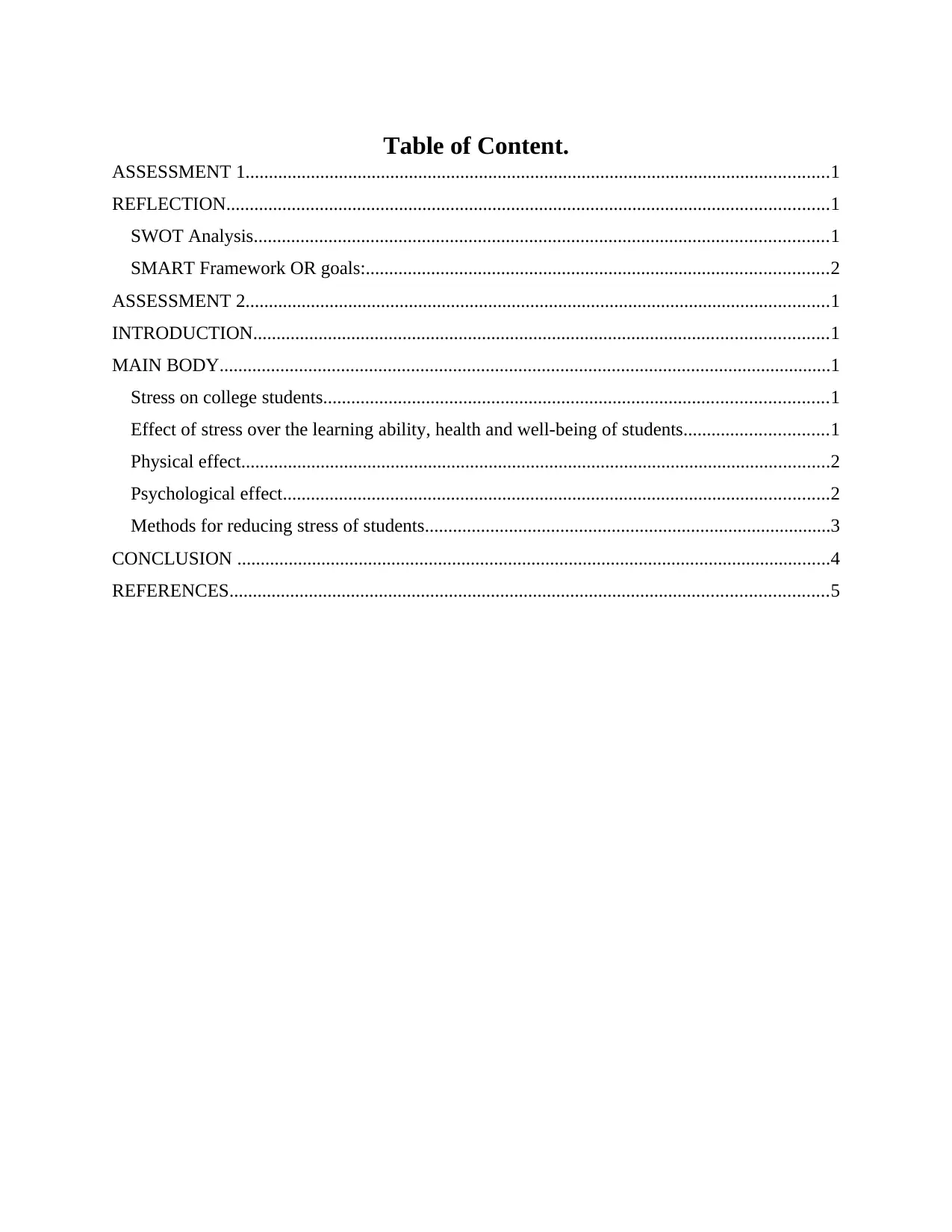
Table of Content.
ASSESSMENT 1.............................................................................................................................1
REFLECTION.................................................................................................................................1
SWOT Analysis...........................................................................................................................1
SMART Framework OR goals:...................................................................................................2
ASSESSMENT 2.............................................................................................................................1
INTRODUCTION...........................................................................................................................1
MAIN BODY...................................................................................................................................1
Stress on college students............................................................................................................1
Effect of stress over the learning ability, health and well-being of students...............................1
Physical effect..............................................................................................................................2
Psychological effect.....................................................................................................................2
Methods for reducing stress of students.......................................................................................3
CONCLUSION ...............................................................................................................................4
REFERENCES................................................................................................................................5
ASSESSMENT 1.............................................................................................................................1
REFLECTION.................................................................................................................................1
SWOT Analysis...........................................................................................................................1
SMART Framework OR goals:...................................................................................................2
ASSESSMENT 2.............................................................................................................................1
INTRODUCTION...........................................................................................................................1
MAIN BODY...................................................................................................................................1
Stress on college students............................................................................................................1
Effect of stress over the learning ability, health and well-being of students...............................1
Physical effect..............................................................................................................................2
Psychological effect.....................................................................................................................2
Methods for reducing stress of students.......................................................................................3
CONCLUSION ...............................................................................................................................4
REFERENCES................................................................................................................................5
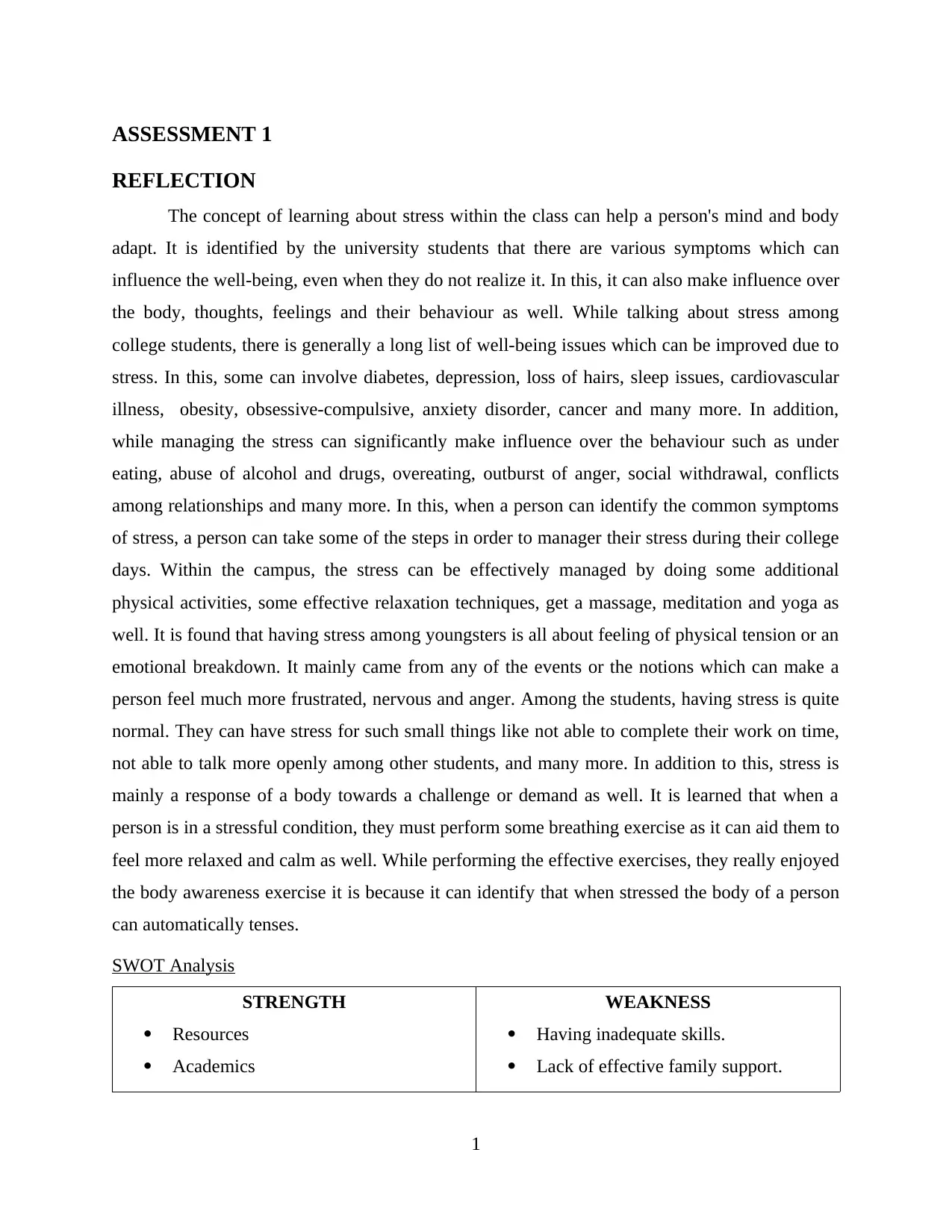
ASSESSMENT 1
REFLECTION
The concept of learning about stress within the class can help a person's mind and body
adapt. It is identified by the university students that there are various symptoms which can
influence the well-being, even when they do not realize it. In this, it can also make influence over
the body, thoughts, feelings and their behaviour as well. While talking about stress among
college students, there is generally a long list of well-being issues which can be improved due to
stress. In this, some can involve diabetes, depression, loss of hairs, sleep issues, cardiovascular
illness, obesity, obsessive-compulsive, anxiety disorder, cancer and many more. In addition,
while managing the stress can significantly make influence over the behaviour such as under
eating, abuse of alcohol and drugs, overeating, outburst of anger, social withdrawal, conflicts
among relationships and many more. In this, when a person can identify the common symptoms
of stress, a person can take some of the steps in order to manager their stress during their college
days. Within the campus, the stress can be effectively managed by doing some additional
physical activities, some effective relaxation techniques, get a massage, meditation and yoga as
well. It is found that having stress among youngsters is all about feeling of physical tension or an
emotional breakdown. It mainly came from any of the events or the notions which can make a
person feel much more frustrated, nervous and anger. Among the students, having stress is quite
normal. They can have stress for such small things like not able to complete their work on time,
not able to talk more openly among other students, and many more. In addition to this, stress is
mainly a response of a body towards a challenge or demand as well. It is learned that when a
person is in a stressful condition, they must perform some breathing exercise as it can aid them to
feel more relaxed and calm as well. While performing the effective exercises, they really enjoyed
the body awareness exercise it is because it can identify that when stressed the body of a person
can automatically tenses.
SWOT Analysis
STRENGTH
Resources
Academics
WEAKNESS
Having inadequate skills.
Lack of effective family support.
1
REFLECTION
The concept of learning about stress within the class can help a person's mind and body
adapt. It is identified by the university students that there are various symptoms which can
influence the well-being, even when they do not realize it. In this, it can also make influence over
the body, thoughts, feelings and their behaviour as well. While talking about stress among
college students, there is generally a long list of well-being issues which can be improved due to
stress. In this, some can involve diabetes, depression, loss of hairs, sleep issues, cardiovascular
illness, obesity, obsessive-compulsive, anxiety disorder, cancer and many more. In addition,
while managing the stress can significantly make influence over the behaviour such as under
eating, abuse of alcohol and drugs, overeating, outburst of anger, social withdrawal, conflicts
among relationships and many more. In this, when a person can identify the common symptoms
of stress, a person can take some of the steps in order to manager their stress during their college
days. Within the campus, the stress can be effectively managed by doing some additional
physical activities, some effective relaxation techniques, get a massage, meditation and yoga as
well. It is found that having stress among youngsters is all about feeling of physical tension or an
emotional breakdown. It mainly came from any of the events or the notions which can make a
person feel much more frustrated, nervous and anger. Among the students, having stress is quite
normal. They can have stress for such small things like not able to complete their work on time,
not able to talk more openly among other students, and many more. In addition to this, stress is
mainly a response of a body towards a challenge or demand as well. It is learned that when a
person is in a stressful condition, they must perform some breathing exercise as it can aid them to
feel more relaxed and calm as well. While performing the effective exercises, they really enjoyed
the body awareness exercise it is because it can identify that when stressed the body of a person
can automatically tenses.
SWOT Analysis
STRENGTH
Resources
Academics
WEAKNESS
Having inadequate skills.
Lack of effective family support.
1
⊘ This is a preview!⊘
Do you want full access?
Subscribe today to unlock all pages.

Trusted by 1+ million students worldwide
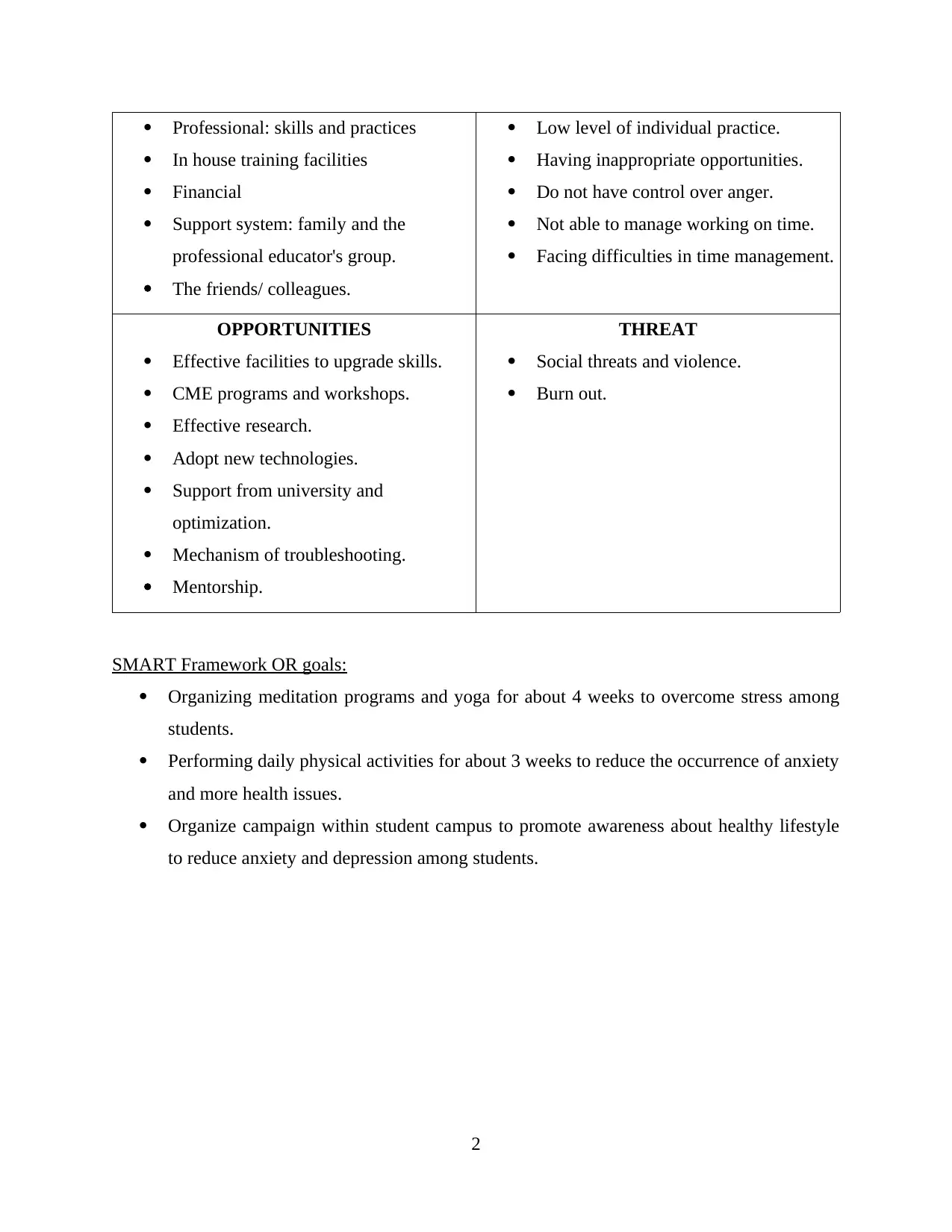
Professional: skills and practices
In house training facilities
Financial
Support system: family and the
professional educator's group.
The friends/ colleagues.
Low level of individual practice.
Having inappropriate opportunities.
Do not have control over anger.
Not able to manage working on time.
Facing difficulties in time management.
OPPORTUNITIES
Effective facilities to upgrade skills.
CME programs and workshops.
Effective research.
Adopt new technologies.
Support from university and
optimization.
Mechanism of troubleshooting.
Mentorship.
THREAT
Social threats and violence.
Burn out.
SMART Framework OR goals:
Organizing meditation programs and yoga for about 4 weeks to overcome stress among
students.
Performing daily physical activities for about 3 weeks to reduce the occurrence of anxiety
and more health issues.
Organize campaign within student campus to promote awareness about healthy lifestyle
to reduce anxiety and depression among students.
2
In house training facilities
Financial
Support system: family and the
professional educator's group.
The friends/ colleagues.
Low level of individual practice.
Having inappropriate opportunities.
Do not have control over anger.
Not able to manage working on time.
Facing difficulties in time management.
OPPORTUNITIES
Effective facilities to upgrade skills.
CME programs and workshops.
Effective research.
Adopt new technologies.
Support from university and
optimization.
Mechanism of troubleshooting.
Mentorship.
THREAT
Social threats and violence.
Burn out.
SMART Framework OR goals:
Organizing meditation programs and yoga for about 4 weeks to overcome stress among
students.
Performing daily physical activities for about 3 weeks to reduce the occurrence of anxiety
and more health issues.
Organize campaign within student campus to promote awareness about healthy lifestyle
to reduce anxiety and depression among students.
2
Paraphrase This Document
Need a fresh take? Get an instant paraphrase of this document with our AI Paraphraser
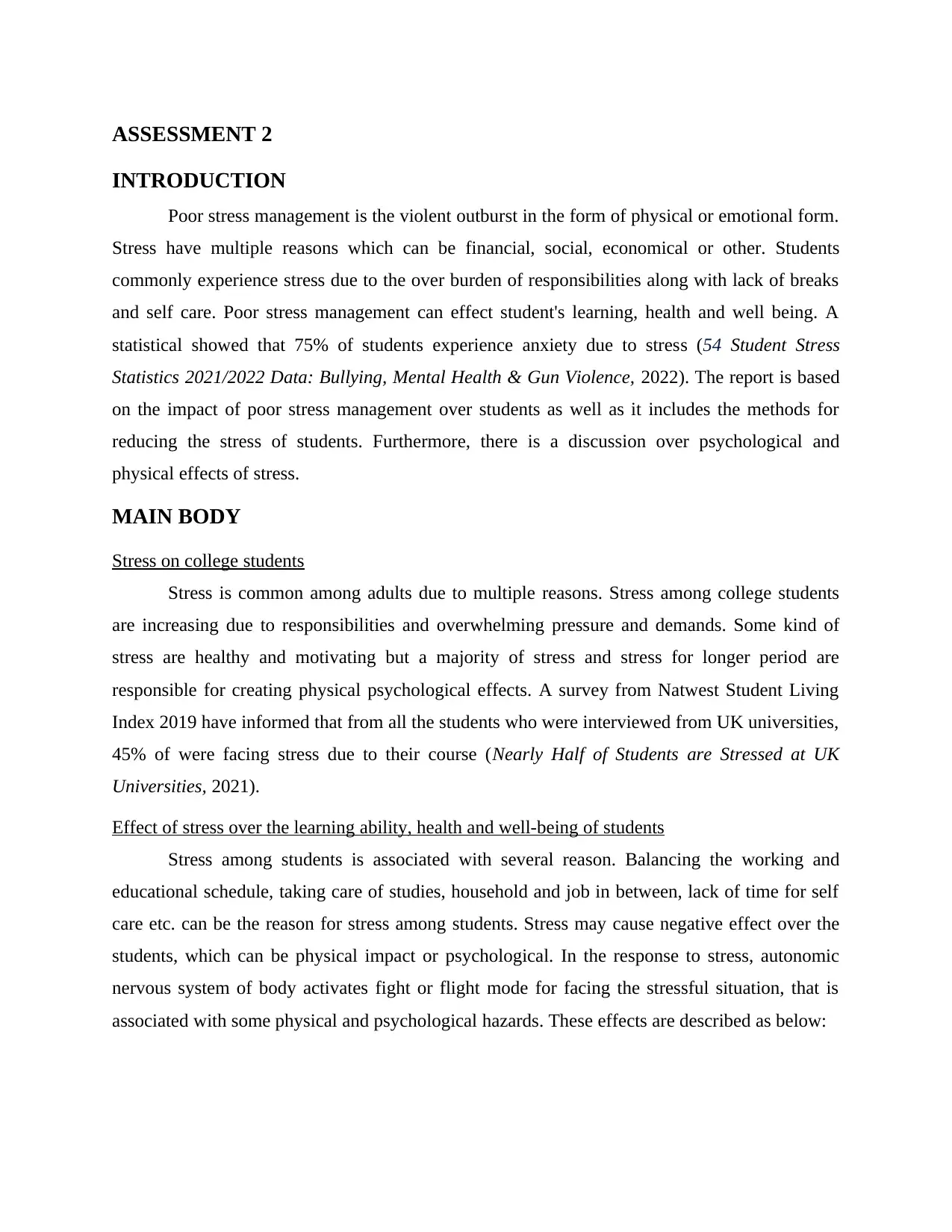
ASSESSMENT 2
INTRODUCTION
Poor stress management is the violent outburst in the form of physical or emotional form.
Stress have multiple reasons which can be financial, social, economical or other. Students
commonly experience stress due to the over burden of responsibilities along with lack of breaks
and self care. Poor stress management can effect student's learning, health and well being. A
statistical showed that 75% of students experience anxiety due to stress (54 Student Stress
Statistics 2021/2022 Data: Bullying, Mental Health & Gun Violence, 2022). The report is based
on the impact of poor stress management over students as well as it includes the methods for
reducing the stress of students. Furthermore, there is a discussion over psychological and
physical effects of stress.
MAIN BODY
Stress on college students
Stress is common among adults due to multiple reasons. Stress among college students
are increasing due to responsibilities and overwhelming pressure and demands. Some kind of
stress are healthy and motivating but a majority of stress and stress for longer period are
responsible for creating physical psychological effects. A survey from Natwest Student Living
Index 2019 have informed that from all the students who were interviewed from UK universities,
45% of were facing stress due to their course (Nearly Half of Students are Stressed at UK
Universities, 2021).
Effect of stress over the learning ability, health and well-being of students
Stress among students is associated with several reason. Balancing the working and
educational schedule, taking care of studies, household and job in between, lack of time for self
care etc. can be the reason for stress among students. Stress may cause negative effect over the
students, which can be physical impact or psychological. In the response to stress, autonomic
nervous system of body activates fight or flight mode for facing the stressful situation, that is
associated with some physical and psychological hazards. These effects are described as below:
INTRODUCTION
Poor stress management is the violent outburst in the form of physical or emotional form.
Stress have multiple reasons which can be financial, social, economical or other. Students
commonly experience stress due to the over burden of responsibilities along with lack of breaks
and self care. Poor stress management can effect student's learning, health and well being. A
statistical showed that 75% of students experience anxiety due to stress (54 Student Stress
Statistics 2021/2022 Data: Bullying, Mental Health & Gun Violence, 2022). The report is based
on the impact of poor stress management over students as well as it includes the methods for
reducing the stress of students. Furthermore, there is a discussion over psychological and
physical effects of stress.
MAIN BODY
Stress on college students
Stress is common among adults due to multiple reasons. Stress among college students
are increasing due to responsibilities and overwhelming pressure and demands. Some kind of
stress are healthy and motivating but a majority of stress and stress for longer period are
responsible for creating physical psychological effects. A survey from Natwest Student Living
Index 2019 have informed that from all the students who were interviewed from UK universities,
45% of were facing stress due to their course (Nearly Half of Students are Stressed at UK
Universities, 2021).
Effect of stress over the learning ability, health and well-being of students
Stress among students is associated with several reason. Balancing the working and
educational schedule, taking care of studies, household and job in between, lack of time for self
care etc. can be the reason for stress among students. Stress may cause negative effect over the
students, which can be physical impact or psychological. In the response to stress, autonomic
nervous system of body activates fight or flight mode for facing the stressful situation, that is
associated with some physical and psychological hazards. These effects are described as below:
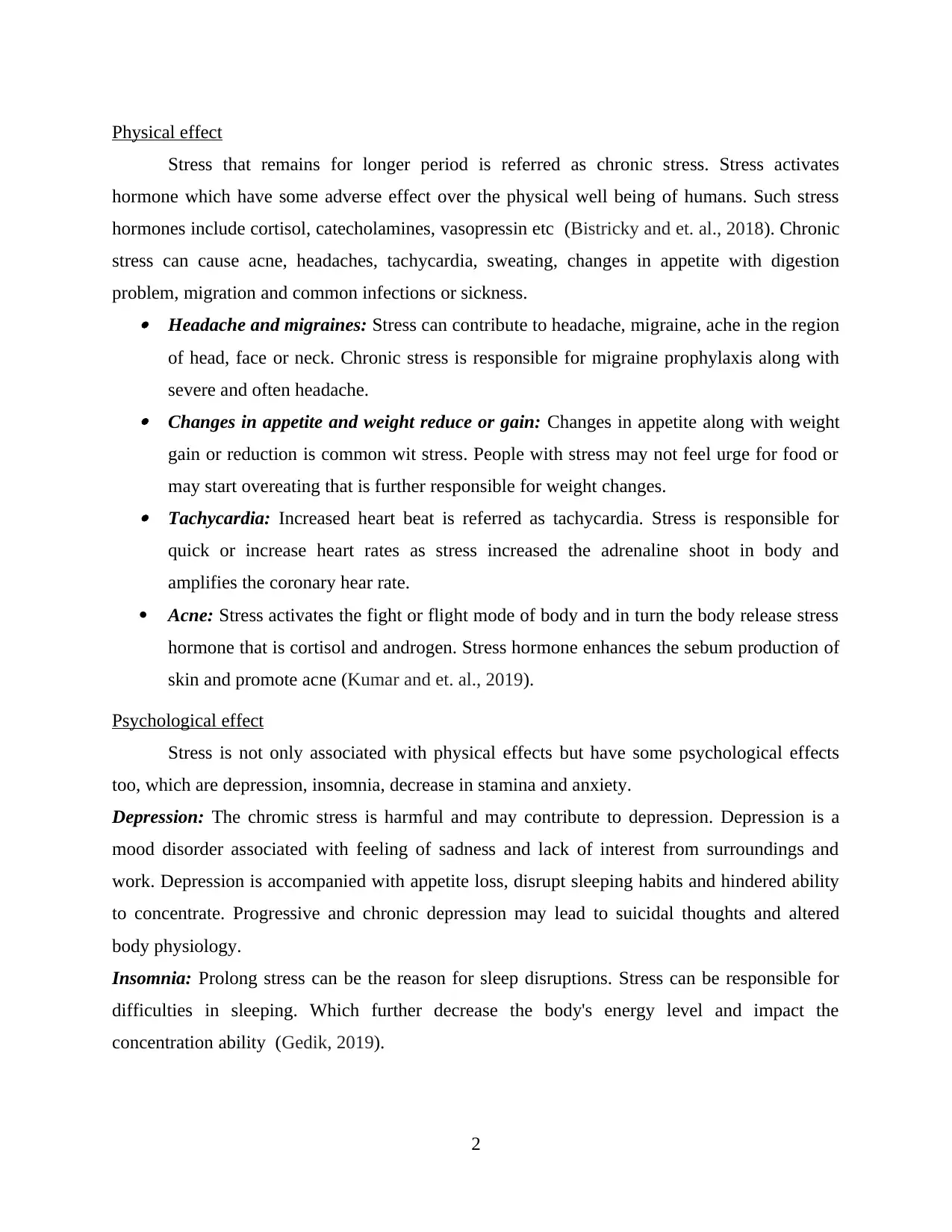
Physical effect
Stress that remains for longer period is referred as chronic stress. Stress activates
hormone which have some adverse effect over the physical well being of humans. Such stress
hormones include cortisol, catecholamines, vasopressin etc (Bistricky and et. al., 2018). Chronic
stress can cause acne, headaches, tachycardia, sweating, changes in appetite with digestion
problem, migration and common infections or sickness. Headache and migraines: Stress can contribute to headache, migraine, ache in the region
of head, face or neck. Chronic stress is responsible for migraine prophylaxis along with
severe and often headache. Changes in appetite and weight reduce or gain: Changes in appetite along with weight
gain or reduction is common wit stress. People with stress may not feel urge for food or
may start overeating that is further responsible for weight changes. Tachycardia: Increased heart beat is referred as tachycardia. Stress is responsible for
quick or increase heart rates as stress increased the adrenaline shoot in body and
amplifies the coronary hear rate.
Acne: Stress activates the fight or flight mode of body and in turn the body release stress
hormone that is cortisol and androgen. Stress hormone enhances the sebum production of
skin and promote acne (Kumar and et. al., 2019).
Psychological effect
Stress is not only associated with physical effects but have some psychological effects
too, which are depression, insomnia, decrease in stamina and anxiety.
Depression: The chromic stress is harmful and may contribute to depression. Depression is a
mood disorder associated with feeling of sadness and lack of interest from surroundings and
work. Depression is accompanied with appetite loss, disrupt sleeping habits and hindered ability
to concentrate. Progressive and chronic depression may lead to suicidal thoughts and altered
body physiology.
Insomnia: Prolong stress can be the reason for sleep disruptions. Stress can be responsible for
difficulties in sleeping. Which further decrease the body's energy level and impact the
concentration ability (Gedik, 2019).
2
Stress that remains for longer period is referred as chronic stress. Stress activates
hormone which have some adverse effect over the physical well being of humans. Such stress
hormones include cortisol, catecholamines, vasopressin etc (Bistricky and et. al., 2018). Chronic
stress can cause acne, headaches, tachycardia, sweating, changes in appetite with digestion
problem, migration and common infections or sickness. Headache and migraines: Stress can contribute to headache, migraine, ache in the region
of head, face or neck. Chronic stress is responsible for migraine prophylaxis along with
severe and often headache. Changes in appetite and weight reduce or gain: Changes in appetite along with weight
gain or reduction is common wit stress. People with stress may not feel urge for food or
may start overeating that is further responsible for weight changes. Tachycardia: Increased heart beat is referred as tachycardia. Stress is responsible for
quick or increase heart rates as stress increased the adrenaline shoot in body and
amplifies the coronary hear rate.
Acne: Stress activates the fight or flight mode of body and in turn the body release stress
hormone that is cortisol and androgen. Stress hormone enhances the sebum production of
skin and promote acne (Kumar and et. al., 2019).
Psychological effect
Stress is not only associated with physical effects but have some psychological effects
too, which are depression, insomnia, decrease in stamina and anxiety.
Depression: The chromic stress is harmful and may contribute to depression. Depression is a
mood disorder associated with feeling of sadness and lack of interest from surroundings and
work. Depression is accompanied with appetite loss, disrupt sleeping habits and hindered ability
to concentrate. Progressive and chronic depression may lead to suicidal thoughts and altered
body physiology.
Insomnia: Prolong stress can be the reason for sleep disruptions. Stress can be responsible for
difficulties in sleeping. Which further decrease the body's energy level and impact the
concentration ability (Gedik, 2019).
2
⊘ This is a preview!⊘
Do you want full access?
Subscribe today to unlock all pages.

Trusted by 1+ million students worldwide
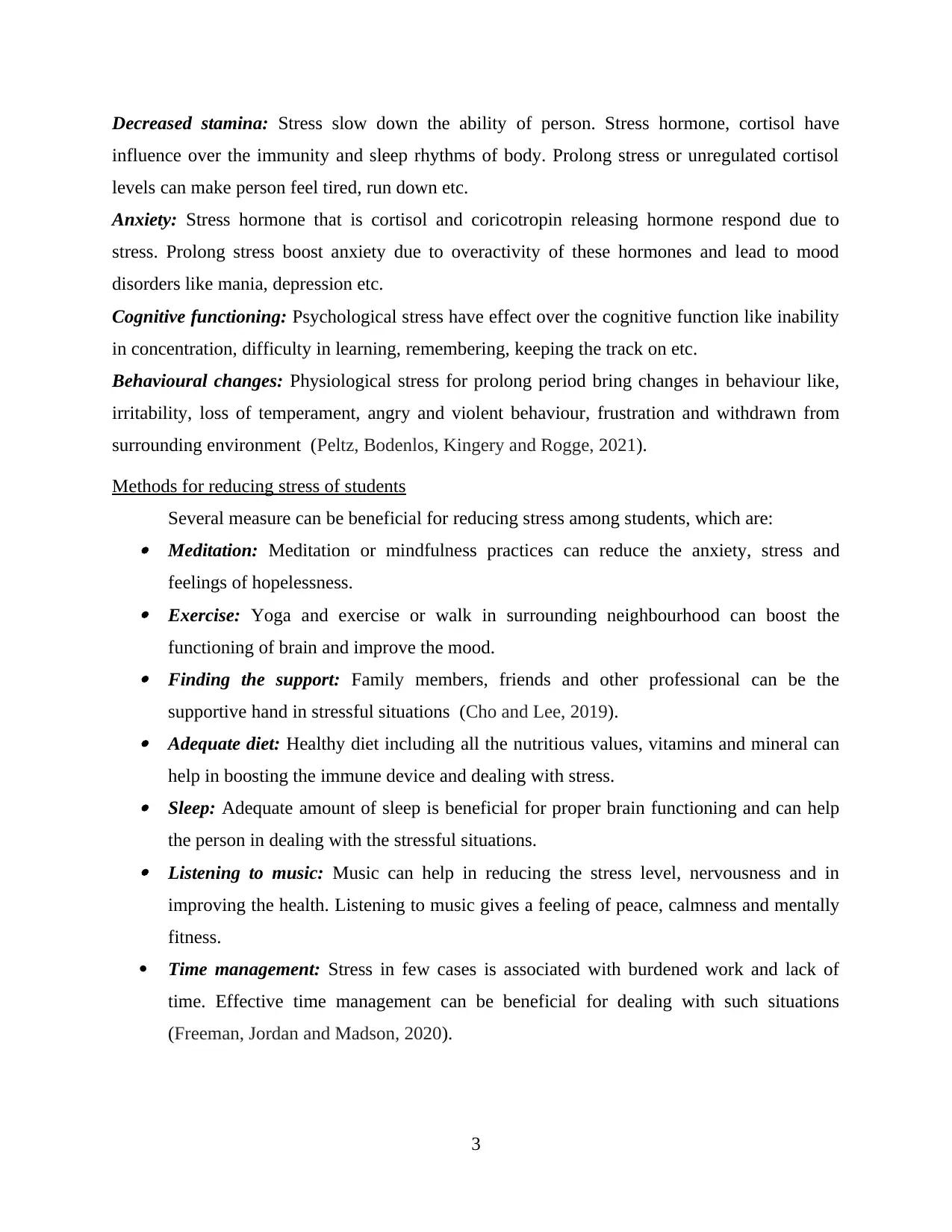
Decreased stamina: Stress slow down the ability of person. Stress hormone, cortisol have
influence over the immunity and sleep rhythms of body. Prolong stress or unregulated cortisol
levels can make person feel tired, run down etc.
Anxiety: Stress hormone that is cortisol and coricotropin releasing hormone respond due to
stress. Prolong stress boost anxiety due to overactivity of these hormones and lead to mood
disorders like mania, depression etc.
Cognitive functioning: Psychological stress have effect over the cognitive function like inability
in concentration, difficulty in learning, remembering, keeping the track on etc.
Behavioural changes: Physiological stress for prolong period bring changes in behaviour like,
irritability, loss of temperament, angry and violent behaviour, frustration and withdrawn from
surrounding environment (Peltz, Bodenlos, Kingery and Rogge, 2021).
Methods for reducing stress of students
Several measure can be beneficial for reducing stress among students, which are: Meditation: Meditation or mindfulness practices can reduce the anxiety, stress and
feelings of hopelessness. Exercise: Yoga and exercise or walk in surrounding neighbourhood can boost the
functioning of brain and improve the mood. Finding the support: Family members, friends and other professional can be the
supportive hand in stressful situations (Cho and Lee, 2019). Adequate diet: Healthy diet including all the nutritious values, vitamins and mineral can
help in boosting the immune device and dealing with stress. Sleep: Adequate amount of sleep is beneficial for proper brain functioning and can help
the person in dealing with the stressful situations. Listening to music: Music can help in reducing the stress level, nervousness and in
improving the health. Listening to music gives a feeling of peace, calmness and mentally
fitness.
Time management: Stress in few cases is associated with burdened work and lack of
time. Effective time management can be beneficial for dealing with such situations
(Freeman, Jordan and Madson, 2020).
3
influence over the immunity and sleep rhythms of body. Prolong stress or unregulated cortisol
levels can make person feel tired, run down etc.
Anxiety: Stress hormone that is cortisol and coricotropin releasing hormone respond due to
stress. Prolong stress boost anxiety due to overactivity of these hormones and lead to mood
disorders like mania, depression etc.
Cognitive functioning: Psychological stress have effect over the cognitive function like inability
in concentration, difficulty in learning, remembering, keeping the track on etc.
Behavioural changes: Physiological stress for prolong period bring changes in behaviour like,
irritability, loss of temperament, angry and violent behaviour, frustration and withdrawn from
surrounding environment (Peltz, Bodenlos, Kingery and Rogge, 2021).
Methods for reducing stress of students
Several measure can be beneficial for reducing stress among students, which are: Meditation: Meditation or mindfulness practices can reduce the anxiety, stress and
feelings of hopelessness. Exercise: Yoga and exercise or walk in surrounding neighbourhood can boost the
functioning of brain and improve the mood. Finding the support: Family members, friends and other professional can be the
supportive hand in stressful situations (Cho and Lee, 2019). Adequate diet: Healthy diet including all the nutritious values, vitamins and mineral can
help in boosting the immune device and dealing with stress. Sleep: Adequate amount of sleep is beneficial for proper brain functioning and can help
the person in dealing with the stressful situations. Listening to music: Music can help in reducing the stress level, nervousness and in
improving the health. Listening to music gives a feeling of peace, calmness and mentally
fitness.
Time management: Stress in few cases is associated with burdened work and lack of
time. Effective time management can be beneficial for dealing with such situations
(Freeman, Jordan and Madson, 2020).
3
Paraphrase This Document
Need a fresh take? Get an instant paraphrase of this document with our AI Paraphraser
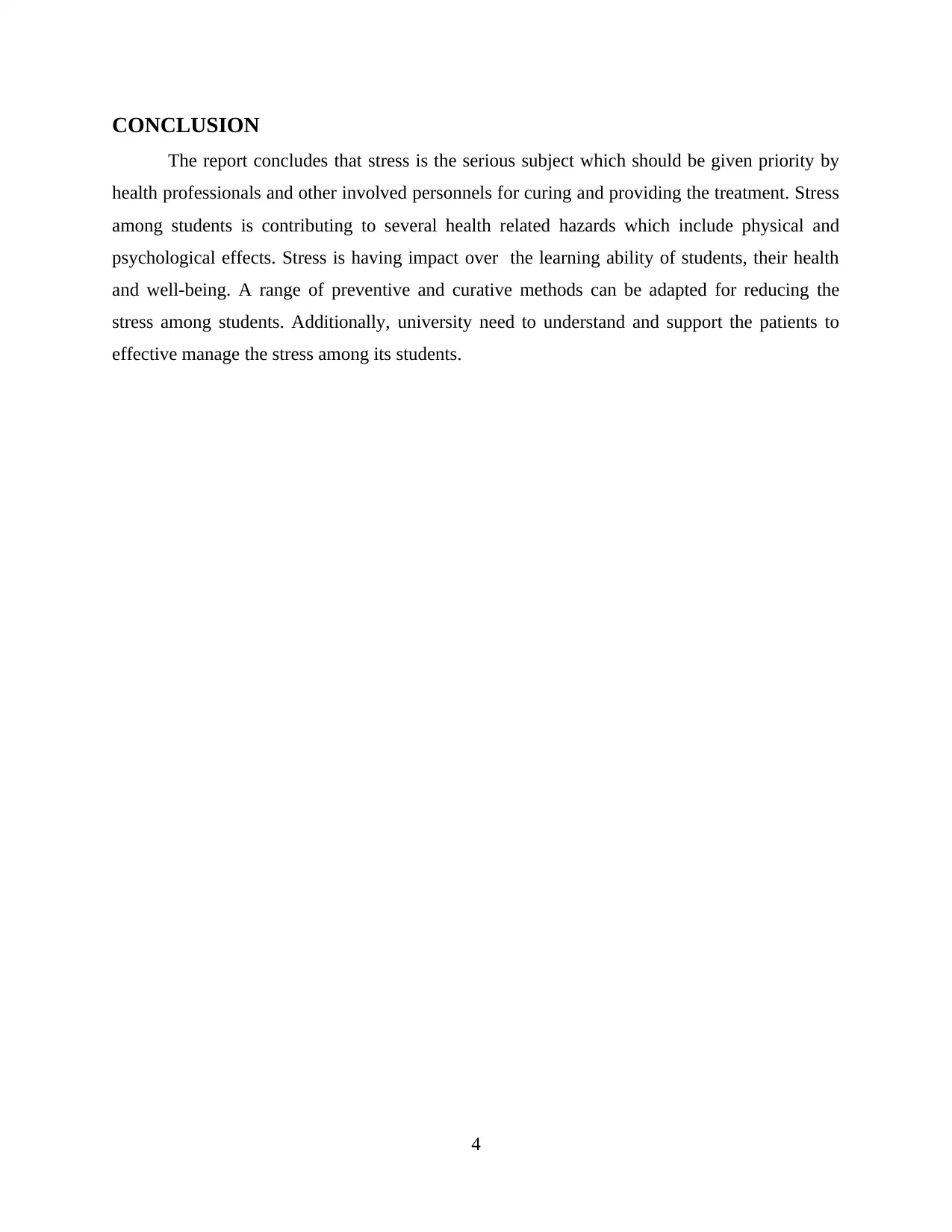
CONCLUSION
The report concludes that stress is the serious subject which should be given priority by
health professionals and other involved personnels for curing and providing the treatment. Stress
among students is contributing to several health related hazards which include physical and
psychological effects. Stress is having impact over the learning ability of students, their health
and well-being. A range of preventive and curative methods can be adapted for reducing the
stress among students. Additionally, university need to understand and support the patients to
effective manage the stress among its students.
4
The report concludes that stress is the serious subject which should be given priority by
health professionals and other involved personnels for curing and providing the treatment. Stress
among students is contributing to several health related hazards which include physical and
psychological effects. Stress is having impact over the learning ability of students, their health
and well-being. A range of preventive and curative methods can be adapted for reducing the
stress among students. Additionally, university need to understand and support the patients to
effective manage the stress among its students.
4
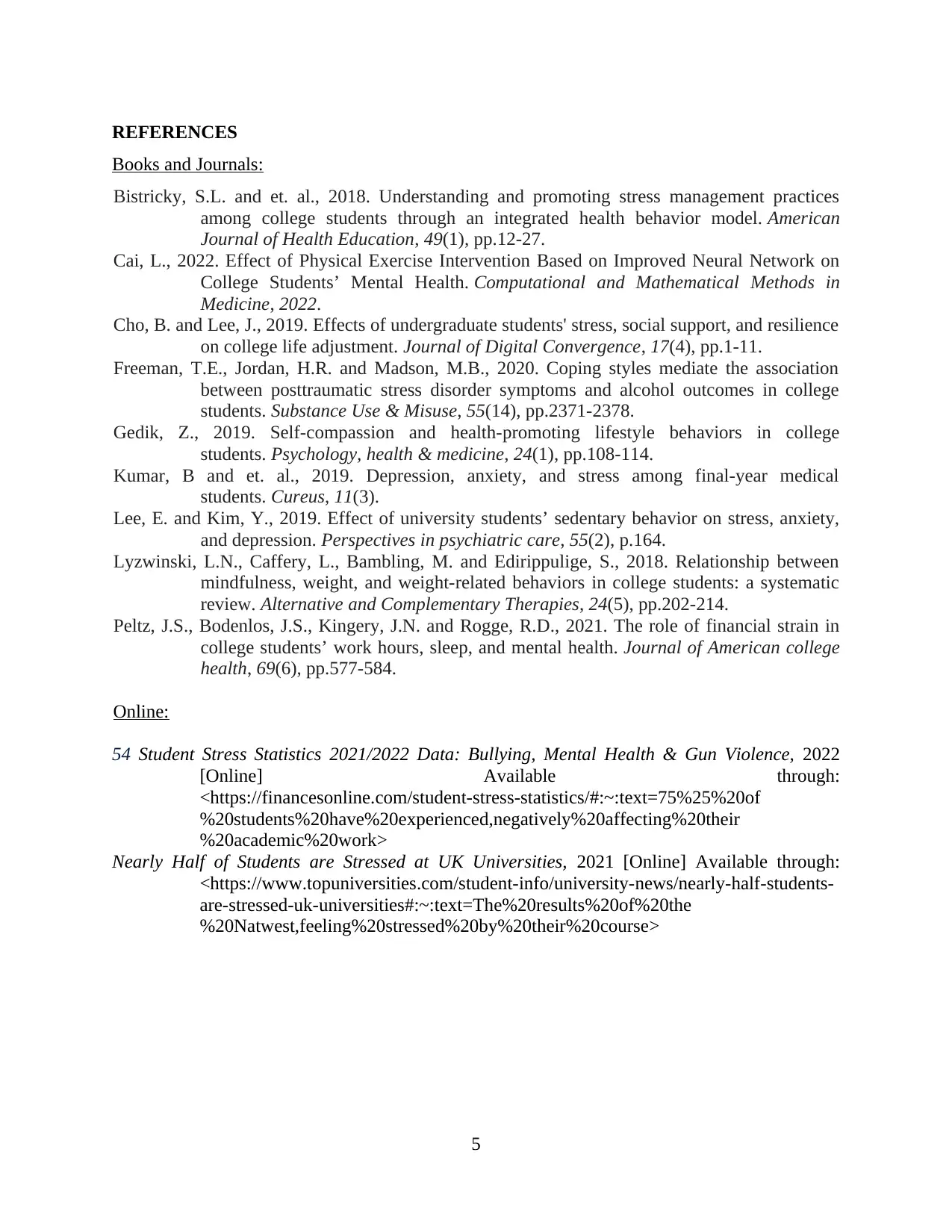
REFERENCES
Books and Journals:
Bistricky, S.L. and et. al., 2018. Understanding and promoting stress management practices
among college students through an integrated health behavior model. American
Journal of Health Education, 49(1), pp.12-27.
Cai, L., 2022. Effect of Physical Exercise Intervention Based on Improved Neural Network on
College Students’ Mental Health. Computational and Mathematical Methods in
Medicine, 2022.
Cho, B. and Lee, J., 2019. Effects of undergraduate students' stress, social support, and resilience
on college life adjustment. Journal of Digital Convergence, 17(4), pp.1-11.
Freeman, T.E., Jordan, H.R. and Madson, M.B., 2020. Coping styles mediate the association
between posttraumatic stress disorder symptoms and alcohol outcomes in college
students. Substance Use & Misuse, 55(14), pp.2371-2378.
Gedik, Z., 2019. Self-compassion and health-promoting lifestyle behaviors in college
students. Psychology, health & medicine, 24(1), pp.108-114.
Kumar, B and et. al., 2019. Depression, anxiety, and stress among final-year medical
students. Cureus, 11(3).
Lee, E. and Kim, Y., 2019. Effect of university students’ sedentary behavior on stress, anxiety,
and depression. Perspectives in psychiatric care, 55(2), p.164.
Lyzwinski, L.N., Caffery, L., Bambling, M. and Edirippulige, S., 2018. Relationship between
mindfulness, weight, and weight-related behaviors in college students: a systematic
review. Alternative and Complementary Therapies, 24(5), pp.202-214.
Peltz, J.S., Bodenlos, J.S., Kingery, J.N. and Rogge, R.D., 2021. The role of financial strain in
college students’ work hours, sleep, and mental health. Journal of American college
health, 69(6), pp.577-584.
Online:
54 Student Stress Statistics 2021/2022 Data: Bullying, Mental Health & Gun Violence, 2022
[Online] Available through:
<https://financesonline.com/student-stress-statistics/#:~:text=75%25%20of
%20students%20have%20experienced,negatively%20affecting%20their
%20academic%20work>
Nearly Half of Students are Stressed at UK Universities, 2021 [Online] Available through:
<https://www.topuniversities.com/student-info/university-news/nearly-half-students-
are-stressed-uk-universities#:~:text=The%20results%20of%20the
%20Natwest,feeling%20stressed%20by%20their%20course>
5
Books and Journals:
Bistricky, S.L. and et. al., 2018. Understanding and promoting stress management practices
among college students through an integrated health behavior model. American
Journal of Health Education, 49(1), pp.12-27.
Cai, L., 2022. Effect of Physical Exercise Intervention Based on Improved Neural Network on
College Students’ Mental Health. Computational and Mathematical Methods in
Medicine, 2022.
Cho, B. and Lee, J., 2019. Effects of undergraduate students' stress, social support, and resilience
on college life adjustment. Journal of Digital Convergence, 17(4), pp.1-11.
Freeman, T.E., Jordan, H.R. and Madson, M.B., 2020. Coping styles mediate the association
between posttraumatic stress disorder symptoms and alcohol outcomes in college
students. Substance Use & Misuse, 55(14), pp.2371-2378.
Gedik, Z., 2019. Self-compassion and health-promoting lifestyle behaviors in college
students. Psychology, health & medicine, 24(1), pp.108-114.
Kumar, B and et. al., 2019. Depression, anxiety, and stress among final-year medical
students. Cureus, 11(3).
Lee, E. and Kim, Y., 2019. Effect of university students’ sedentary behavior on stress, anxiety,
and depression. Perspectives in psychiatric care, 55(2), p.164.
Lyzwinski, L.N., Caffery, L., Bambling, M. and Edirippulige, S., 2018. Relationship between
mindfulness, weight, and weight-related behaviors in college students: a systematic
review. Alternative and Complementary Therapies, 24(5), pp.202-214.
Peltz, J.S., Bodenlos, J.S., Kingery, J.N. and Rogge, R.D., 2021. The role of financial strain in
college students’ work hours, sleep, and mental health. Journal of American college
health, 69(6), pp.577-584.
Online:
54 Student Stress Statistics 2021/2022 Data: Bullying, Mental Health & Gun Violence, 2022
[Online] Available through:
<https://financesonline.com/student-stress-statistics/#:~:text=75%25%20of
%20students%20have%20experienced,negatively%20affecting%20their
%20academic%20work>
Nearly Half of Students are Stressed at UK Universities, 2021 [Online] Available through:
<https://www.topuniversities.com/student-info/university-news/nearly-half-students-
are-stressed-uk-universities#:~:text=The%20results%20of%20the
%20Natwest,feeling%20stressed%20by%20their%20course>
5
⊘ This is a preview!⊘
Do you want full access?
Subscribe today to unlock all pages.

Trusted by 1+ million students worldwide
1 out of 9
Related Documents
Your All-in-One AI-Powered Toolkit for Academic Success.
+13062052269
info@desklib.com
Available 24*7 on WhatsApp / Email
![[object Object]](/_next/static/media/star-bottom.7253800d.svg)
Unlock your academic potential
Copyright © 2020–2026 A2Z Services. All Rights Reserved. Developed and managed by ZUCOL.




